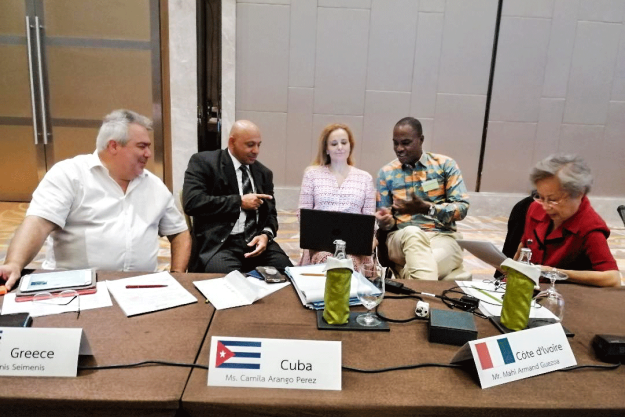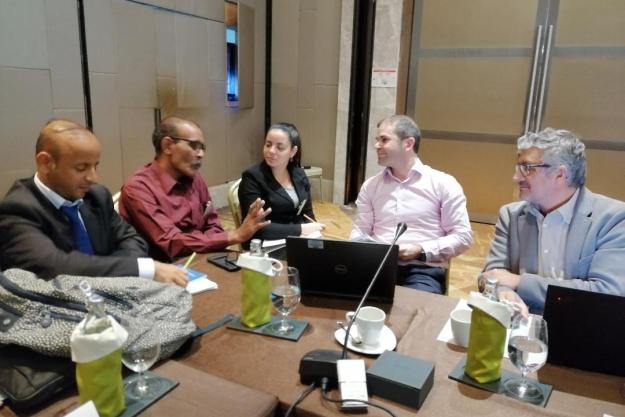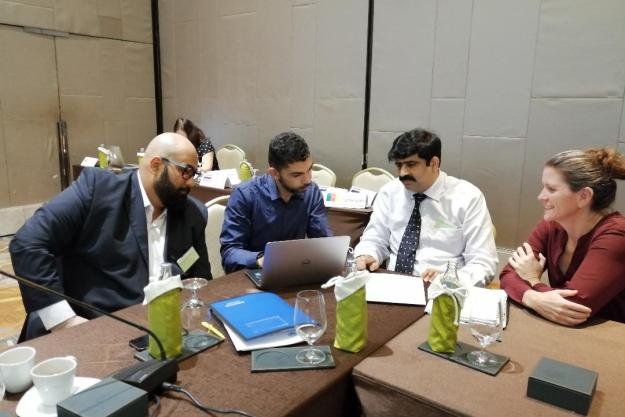
Participants at an integrated chemicals management during a training held in Bangkok
THE HAGUE, Netherlands — 9 September 2019 — Top managers from Member States of the Organisation for the Prohibition of Chemical Weapons (OPCW) across the globe gained in-depth knowledge and leadership skills in integrated chemicals management during a training held in Bangkok, Thailand, from 3-6 September.
The OPCW’s Executive Programme in Integrated Chemicals Management, already in its third edition, gathered 33 chemists, chemical engineers, government representatives and industry professionals working in managerial and leadership positions related to the implementation of the Chemical Weapons Convention (CWC).

Deputy Director-General of the Department of Industrial Works at Thailand’s Ministry of Industry, Mr Banjong Sukreeta, addressed the expert audience and stated in his opening speech: “Sound chemicals management is essential to achieving sustainable development, and impacts a variety of areas, such as health, agriculture, biodiversity, and poverty reduction. The complex nature of chemical systems requires an integrated and holistic approach to management, which also has to include the safety and security aspects of the Chemical Weapons Convention.”
Programme Officer from the OPCW’s International Cooperation Branch, Ms Halimatussaadiah Mat Som, emphasised in her opening remarks the importance of strong leadership in setting foundations for robust chemical management. “Leaders must be aware of the vital link between safety, security and sustainable development, and ensure that chemistry is used solely for peaceful purposes,” she stressed.

The training covered a variety of topics relevant to those leading the implementation of integrated chemicals management from both policy and industrial perspectives.
The programme included panel discussions on the implementation of the CWC and current trends and challenges in the global chemical industry. The participants also learned about sustainable development in chemical education and leadership practices for better laboratory culture.
Presentations given by The European Chemical Industry Council (CEFIC), the United Nations Environment Programme (UNEP), and the Organisation for Economic Co-operation and Development (OECD) further informed participants about leading methods and procedures in integrated chemicals management.

Huntsman (Thailand) Limited gave participants the opportunity to visit its chemical plant site and observe the practical application of best practices for sustainable, safe and secure management of chemicals.
The training programme was organised with the support the Thailand National Authority. The following 20 OPCW Member States sent representatives: Argentina, Azerbaijan, Belgium, China, Costa Rica, Cote d’Ivoire, Cuba, India, Italy, Greece, Kenya, Malaysia, Oman, Pakistan, Sudan, Saudi Arabia, Thailand, Tunisia, Turkey, and the United States of America.

Background
The Executive Programme in Integrated Chemicals Management is part of OPCW’s activities to implement the Components of an Agreed Framework for the Full Implementation of Article XI, established by the decision of the Conference of States Parties in 2011 (C-16/DEC.10 dated 1 December 2011).
As the implementing body for the Chemical Weapons Convention, the OPCW, with its 193 Member States, oversees the global endeavour to permanently eliminate chemical weapons. Since the Convention’s entry into force in 1997, it is the most successful disarmament treaty eliminating an entire class of weapons of mass destruction.
Over 97% of all chemical weapon stockpiles declared by possessor States have been destroyed under OPCW verification. For its extensive efforts in eliminating chemical weapons, the OPCW received the 2013 Nobel Peace Prize.
More Information

